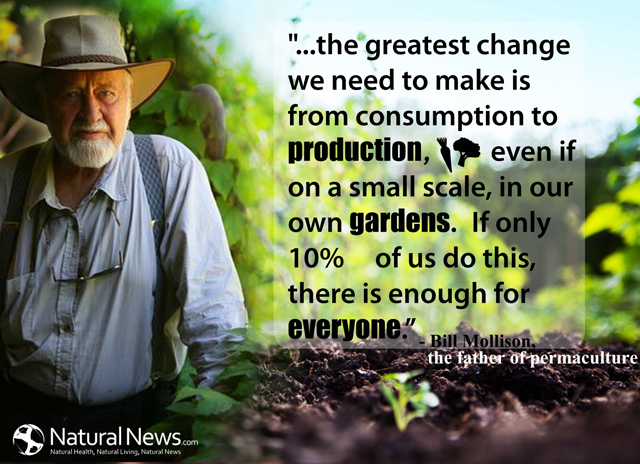Permaculture: A Quiet Revolution – An Interview with Bill Mollison
Fragments From An Interview By Scott London: Permaculture: A Quiet Revolution – An Interview with Bill Mollison
Permaculture from permanent and agriculture — is an integrated design philosophy that encompasses gardening, architecture, horticulture, ecology, even money management and community design. The basic approach is to create sustainable systems that provide for their own needs and recycle their waste.
Mollison developed permaculture after spending decades in the rainforests and deserts of Australia studying ecosystems. He observed that plants naturally group themselves in mutually beneficial communities. He used this idea to develop a different approach to agriculture and community design, one that seeks to place the right elements together so they sustain and support each other.
……
London: Permaculture teaches us how to use the minimum amount of energy needed to get a job done.
Mollison: That’s right. Every house should be over-producing its energy and be selling to the grid. We have built entire villages that do that — where one or two buildings hold the solar panels for all sixty homes and sell the surplus to the grid. In seven years, you can pay off all your expenses and run free.
London: Short of starting a farm, what can we do to make our cities more sustainable?
Mollison: Catch the water off your roof. Grow your own food. Make your own energy. It’s insanely easy to do all that. It takes you less time to grow your food than to walk down to the supermarket to buy it. Ask any good organic gardener who mulches how much time he spends on his garden and he’ll say, “Oh, a few minutes every week.” By the time you have taken your car and driven to the supermarket, taken your foraging-trolley and collected your wild greens, and driven back home again, you’ve spent a good hour or two — plus you’ve spent a lot of money.
London: Even though permaculture is based on scientific principles, it seems to have a very strong philosophical or ethical dimension.
Mollison: There is an ethical dimension because I think science without ethics is sociopathology. To say, “I’ll apply what I know regardless of the outcome” is to take absolutely no responsibility for your actions. I don’t want to be associated with that sort of science.
London: What do you think you’ve started?
Mollison: Well, it’s a revolution. But it’s the sort of revolution that no one will notice. It might get a little shadier. Buildings might function better. You might have less money to earn because your food is all around you and you don’t have any energy costs. Giant amounts of money might be freed up in society so that we can provide for ourselves better.
So it’s a revolution. But permaculture is anti-political. There is no room for politicians or administrators or priests. And there are no laws either. The only ethics we obey are care of the earth, care of people, and reinvestment in those ends.
Source: Scott London

